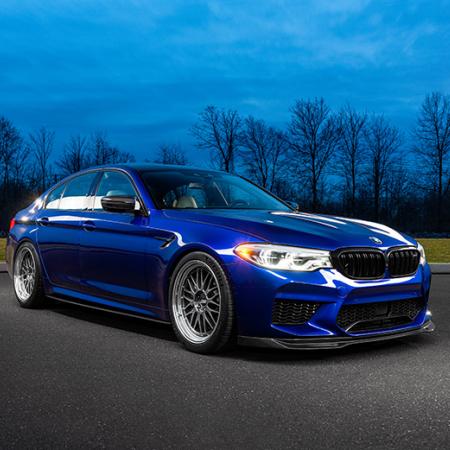One way to forecast what BMW is thinking when it comes to new models is to watch the trademark applications it makes in Germany—and in the U.S. and Canada. That's how we first knew that the M3 CS would be a possibility. Now it appears that BMW is considering an expanded line of vehicles from its BMW i sub-brand—and that they may be based on BMW's family of X vehicles.
Currently, BMW i has three models under its sub-brand: the BMW i3, i3s, and i8 Coupe. That list will grow to four next year when the i8 Roadster goes into production. A number of plug-in hybrid versions of conventional gasoline-powered BMWs also carry the iPerformance badge. While they are using technology from BMW i, they are not pure BMW i vehicles. We know that BMW will build an all-electric version of the BMW X3 Sports Activity Vehicle starting in 2019. Based on BMW's latest trademark applications, that electric X3 could be badged as a BMW iX3 and be the fifth BMW i vehicle. Or sixth, if BMW surprises us first with a production BMW i sedan hinted at by CEO Harald Krüger. We think the iX3 is a better bet at this point.
But either BMW is covering all its bases with trademark applications, or it's planning to electrify a bunch more X vehicles. Besides trademarking "iX3, BMW has also called for dibs on iX1, iX2, iX4, iX5, iX6, iX7, iX8 and iX9. Theoretically then, the iX3 could be the forerunner of a whole line of pure-electric Sports Activity Vehicles and Coupes.
Yes, there is no X8 or X9—yet. But rumors are already circulating that BMW is planning a super-luxurious Sports Activity Coupe version of its impending BMW X7 that is due out next year. We know that BMW is super-serious about electromobility, so why not a fully electric X7 or X8? BMW may decide to see how production and sales of an iX3 go before committing to another pure-electric X vehicle, especially a really big one, but if it does, a name will be waiting.
This could also signify that BMW is extremely worried about meeting its 2025 European Union fleet emissions and fuel mileage mandates. Failure to do so could cost the company hundreds of millions—if not billions—of euros. It's getting harder and harder to reduce emissions while maintaining powerful gasoline and diesel engines, so dropping the company's overall average emissions per vehicle by factoring in an increasing number of zero-emission-vehicles—electric—may be the only solution.
BMW could also be looking even farther down the road, to 2040 and beyond when France, Germany, Great Britain, and BMW's largest market, China, have threatened to eliminate altogether the sale of vehicles powered by internal-combustion engines.
BMW would not be in the good financial position it is in today without its line of X vehicles. As electric vehicles become a larger portion of the total vehicles on the road, maybe BMW is betting that electric X vehicles will help keep it profitable.—Scott Blazey
[Photos courtesy of BMW AG.]












